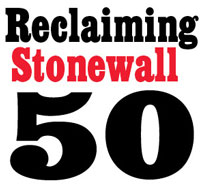 We tend to think of LGBTQ history as a linear progression marked by iconic moments of rebellion, struggle, and ultimate victory—as if we could trace a straight line from the Stonewall riots in 1969 to the Supreme Court victory in Obergefell nearly 50 years later. The reality is much different. In truth, our progress has rarely followed a straight line, and no victory has ever been assured. And, as we are painfully relearning now, gains made in one generation can be lost in the next.
We tend to think of LGBTQ history as a linear progression marked by iconic moments of rebellion, struggle, and ultimate victory—as if we could trace a straight line from the Stonewall riots in 1969 to the Supreme Court victory in Obergefell nearly 50 years later. The reality is much different. In truth, our progress has rarely followed a straight line, and no victory has ever been assured. And, as we are painfully relearning now, gains made in one generation can be lost in the next.
A year after the Stonewall riots, the first gay pride marches in New York, Los Angeles, and San Francisco launched a decade of astonishing change. The signal gay rights victories of this period are well-known: removing “homosexuality” as a mental illness, repealing many state sodomy laws, and passing dozens of local and state laws prohibiting discrimination based on sexual orientation.
While less familiar, the gains achieved for transgender people in this decade are even more remarkable. Across the country, almost every state enacted laws permitting transgender people to obtain corrected gender markers on their birth certificates. In 1975, Minneapolis became the first city to pass a law prohibiting discrimination against transgender people. The same year, former Brady Bunch dad Robert Reed was recognized with an Emmy nomination for his role as a doctor who undergoes a gender transition in the popular television series Medical Center. In 1977, a New York court held that Renée Richards, a transgender woman, could play in professional women’s tennis competitions. And perhaps most remarkable of all, advocates secured federal support for gender clinics and federal funding for sex reassignment surgeries and other transition-related care.
Even before the decade ended, however, there were signs of trouble. In Florida, Anita Bryant’s 1977 Save Our Children campaign demonized gay men as dangerous pedophiles. Harvey Milk was assassinated in 1978. And in one of the 70s’ most improbable political pairings, Jesse Helms, a right wing senator from North Carolina, and Janice Raymond, a self-declared lesbian feminist, simultaneously attacked and demonized transgender women. Helms and Raymond mounted a successful political campaign to bar federal funding of health care for transgender people who received Medicare. Across the country, many gender clinics shut their doors, and many states followed the federal government in barring any funding for transition-related care in state Medicaid programs.
By the mid-’80s, a brutal backlash was well underway. In 1986, the Supreme Court upheld state laws criminalizing same sex intimacy in Bowers v. Hardwick, unleashing a wave of new measures aimed at stripping LGBTQ people of legal protections. That backlash was soon made immeasurably worse by the callousness of Presidents Reagan and Bush toward gay and bi men and transgender people with HIV and AIDS.
These devastating setbacks resulted in the loss of millions of LGBTQ lives and profound suffering and harm. At the same time, those years of exclusion and loss marked one of the most transformative periods of LGBTQ organizing, from the groundbreaking activism of ACTUP to the emergence of newly energized transgender, bisexual, and Black and Brown constituencies demanding more inclusion and representation in the broader movement.
By the time of President Obama’s election in 2008, the movement was well-positioned to push for and win broad federal reforms in health care, education, housing, employment, and prisons—including many that benefitted the most marginalized people in LGBTQ communities, such as those who are incarcerated, homeless, or dependent on federal public health benefits. To be sure, these gains were far from complete, and barely scratched the surface of many systemic inequities. But they were important, not only because they improved the lives of so many LGBTQ people, but because they seemed to usher in a new era of potentially more radical change.
Today, as we watch each of these gains being dismantled by the current administration, we would do well to remember that the lesson of Stonewall is not that history and justice are on our side, but that history helps those who fight for themselves. If the cruelty of the push to roll back our recent progress feels unprecedented, it is only because we have so many more victories to defend now than we ever have before. Backlash is inevitable, but the history of our movement is that each effort to drive us back to the margins of society has unleashed new waves of creativity and inspired new generations to come back fighting harder—and smarter—than before.


